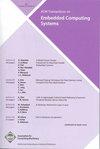Keep in Balance: Runtime-reconfigurable Intermittent Deep Inference
IF 2.6
3区 计算机科学
Q2 COMPUTER SCIENCE, HARDWARE & ARCHITECTURE
引用次数: 0
Abstract
Intermittent deep neural network (DNN) inference is a promising technique to enable intelligent applications on tiny devices powered by ambient energy sources. Nonetheless, intermittent execution presents inherent challenges, primarily involving accumulating progress across power cycles and having to refetch volatile data lost due to power loss in each power cycle. Existing approaches typically optimize the inference configuration to maximize data reuse. However, we observe that such a fixed configuration may be significantly inefficient due to the fluctuating balance point between data reuse and data refetch caused by the dynamic nature of ambient energy. This work proposes DynBal , an approach to dynamically reconfigure the inference engine at runtime. DynBal is realized as a middleware plugin that improves inference performance by exploring the interplay between data reuse and data refetch to maintain their balance with respect to the changing level of intermittency. An indirect metric is developed to easily evaluate an inference configuration considering the variability in intermittency, and a lightweight reconfiguration algorithm is employed to efficiently optimize the configuration at runtime. We evaluate the improvement brought by integrating DynBal into a recent intermittent inference approach that uses a fixed configuration. Evaluations were conducted on a Texas Instruments device with various network models and under varied intermittent power strengths. Our experimental results demonstrate that DynBal can speed up intermittent inference by 3.26 times, achieving a greater improvement for a large network under high intermittency and a large gap between memory and computation performance.保持平衡:运行时可重构的间歇深度推理
间歇性深度神经网络(DNN)推理是一种很有前途的技术,可以在由环境能源驱动的微型设备上实现智能应用。尽管如此,间歇性执行带来了固有的挑战,主要涉及跨电源周期累积进度,并且必须重新获取由于每个电源周期中的电源丢失而丢失的易失性数据。现有的方法通常会优化推理配置以最大化数据重用。然而,我们观察到,由于环境能量的动态性导致数据重用和数据重取之间的平衡点波动,这种固定配置可能会显着降低效率。这项工作提出了DynBal,一种在运行时动态重新配置推理引擎的方法。DynBal是作为一个中间件插件实现的,它通过探索数据重用和数据重取之间的相互作用来提高推理性能,以保持它们在间歇性变化水平方面的平衡。考虑间歇性的可变性,提出了一种间接度量来方便地评估推理配置,并采用了一种轻量级的重构算法来有效地优化运行时的配置。我们评估了将DynBal集成到最近使用固定配置的间歇性推理方法中所带来的改进。在不同网络模型和不同间歇功率强度下,对德州仪器设备进行了评估。我们的实验结果表明,DynBal可以将间歇性推理的速度提高3.26倍,对于高间歇性和内存与计算性能之间较大差距的大型网络实现了更大的改进。
本文章由计算机程序翻译,如有差异,请以英文原文为准。
求助全文
约1分钟内获得全文
求助全文
来源期刊

ACM Transactions on Embedded Computing Systems
工程技术-计算机:软件工程
CiteScore
3.70
自引率
0.00%
发文量
138
审稿时长
6 months
期刊介绍:
The design of embedded computing systems, both the software and hardware, increasingly relies on sophisticated algorithms, analytical models, and methodologies. ACM Transactions on Embedded Computing Systems (TECS) aims to present the leading work relating to the analysis, design, behavior, and experience with embedded computing systems.
 求助内容:
求助内容: 应助结果提醒方式:
应助结果提醒方式:


